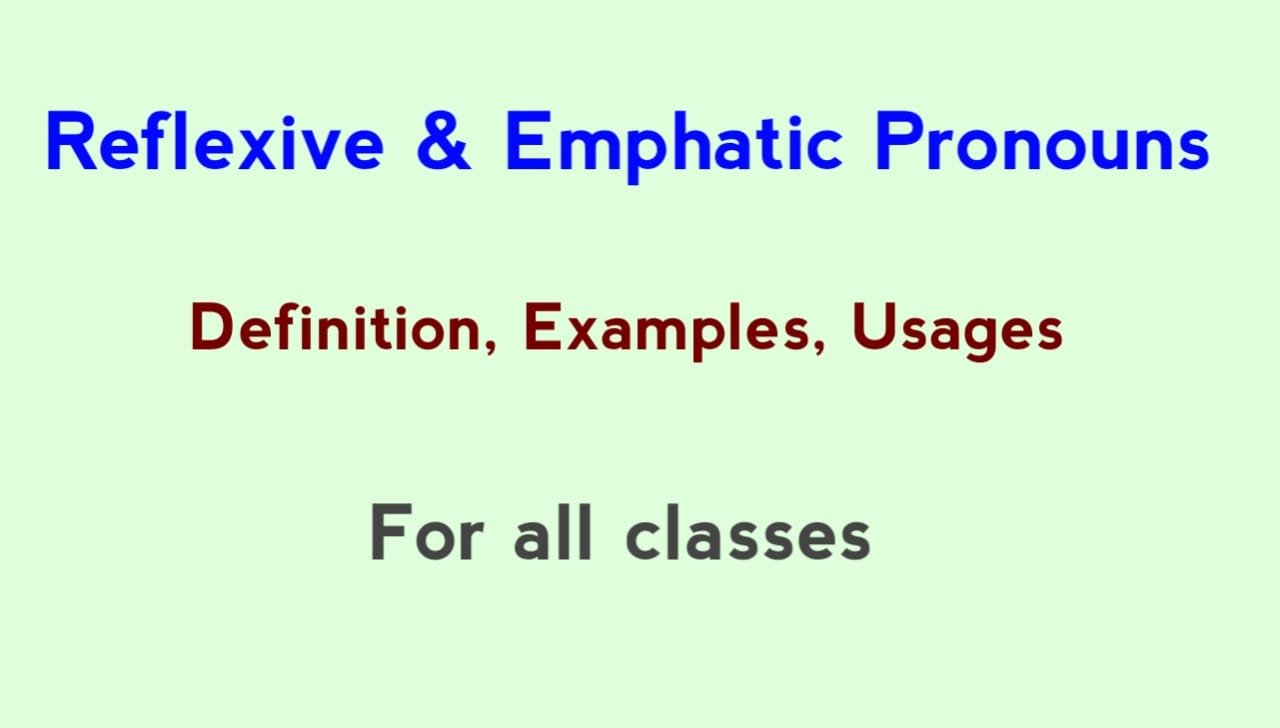Reflexive and Emphatic Pronouns: Definition, Usage, Examples are discussed in the following. Both Reflexive and Emphatic Pronouns are important.
Reflexive Pronouns
When the object of the verb refers to the same person or thing as the subject of the verb, the pronoun used as the object is called a Reflexive Pronoun.
Reflexive Pronouns are formed by adding self and selves to my, your, him, her, our, your, them.
So, they are called compound personal pronouns :
Reflexive Pronouns Examples
(1) I hurt myself.
(2) We enjoyed ourselves.
(3) you are running yourself.
(4) They hit themselves.
People also read:
| Personal Pronoun | Interrogative Pronoun |
| Possessive Pronoun | Distributive Pronoun |
| Demonstrative Pronoun | Reflexive & Emphatic Pronoun |
| Relative Pronoun | Indefinite Pronoun |
Usage of Reflexive Pronouns
Reflexive pronouns can be used –
(1) as an ordinary object :
- He killed himself.
(2) As an indirect object :
- She gave herself much trouble.
(3) As an object of a preposition :
- She cooks only for herself.
Reflexive Pronouns are normally used after verbs and prepositions in Sentences.
Emphatic Pronouns
Emphatic Pronoun is a kind of Compound Personal Pronoun or Reflexive Pronoun that is used to emphasize the nouns and the pronouns for which they stand.
Examples of Emphatic Pronouns
(1) I myself saw the accident.
(2) The boy himself was surprised at his successful.
(3) She made this pretty dress herself.
Check also:
Usage of Emphatic Pronouns
Emphatic Pronouns cannot stand alone as a subject :
- Myself saw him do it. ( incorrect)
- I myself saw him do it. (correct)
- Mrs Sinha and myself will go to Kolkata. ( incorrect)
- Mrs. Sinha and I myself will go to Kolkata. (correct)
Emphatic Pronouns are normally used after nouns and pronouns in Sentences.
Difference between Reflexive and Emphatic Pronoun.
| Reflexive Pronoun | Emphatic Pronoun |
| (1) The action done by the subject reflects upon the subject: He killed himself. | (1) Emphatic Pronoun is generally in apposition with another word : I myself saw the man. |
| (2) It refers to the subject: They hurt themselves | (2) It cannot stand alone as a subject: She herself did the work. |
| (3) It is generally placed after a verb or preposition: He killed himself. She only cooks for herself. | (3) It is generally placed after a noun or pronoun: She herself did the work. |







